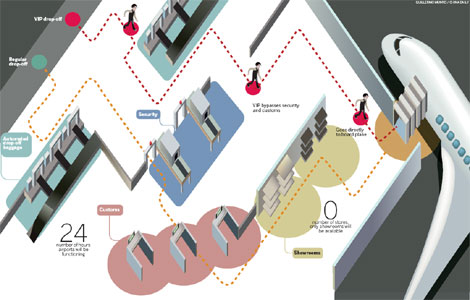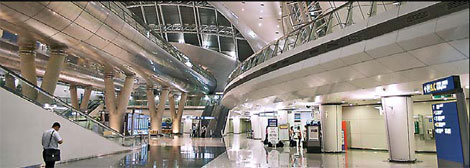Takeoffs of tomorrow
Updated: 2012-02-02 16:39
By Deng Zhangyu (China Daily)
|
|||||||||||

 |
|
Passengers can use their passports to bypass the traditional emigration and immigration procedures at Incheon International Airport. Provided to China Daily |
Experts imagine future airport experiences to be faster, easier and even fun. Deng Zhangyu reports.
Imagine flying in 2025. You take a taxi to the airport, carrying only a small suitcase or a handbag. Upon arrival, you walk directly to the boarding gate - no check-in, no security check and no emigration procedures. When you land on the other side of the Earth after more than 10 hours on the flight, you just stroll out of the airport, jump in a taxi and head to your hotel, where your luggage is waiting. Hard to believe? Actually, this is a blueprint for the flying experience of tomorrow, described in The Airport of The Future, a white paper by CAP Strategic Research Ltd. The report predicts airports in 2025 will speed up security checks, forbid checked-in luggage, simplify emigration and immigration procedures, operate 24 hours and have no shops - only showrooms.
So, the future of flying will be fun and easy instead of stressful and time-consuming.
"It sounds like a fairy tale. But it's happening," Roger Thomas, CEO of the aviation research and consultancy company, says.
"It takes time to move through."
Frequent flier and China Investment Forum executive director Petr Hyl takes more than 100 flights between China and Europe a year. On a stopover in Istanbul when he was returning to Europe from China, he left the hotel two hours early but caught his flight at the last minute.
"You wait in a line to be checked in," he says.
"You wait in a line at emigration. You wait in a line at security checks. You wait for boarding. You wait for your luggage to arrive. That's the most annoying thing about traveling by air - wasting your time waiting."
But the efficient airport system of the future will cost passengers about half the time, Thomas says.
"You just need to get to the airport 45 minutes earlier, and enjoy dining and shopping there."
The most difficult prediction to materialize is the scheme in which trusted travelers are exempted from security checks.
"Countries like Canada, Germany and South Korea already have trusted traveler programs, which now are mainly to do with the immigration and emigration," Thomas says.
The International Air Transport Association (IATA) says the current security-check system isn't effective, and wastes time and energy, investigating countless bags rather than high-risk passengers.
"Today's checkpoint was designed four decades ago to stop hijackers carrying metal weapons," IATA's director general Giovanni Bisignani says.
"We need a process that responds to today's threats. It must amalgamate intelligence based on passenger information and new technology. That means moving from a system that looks for bad objects to one that can find bad people."
So, the future security check will be divided into three channels, according to a passenger's risk rate - no security for known travelers, normal security for ordinary people and enhanced security for people regarded as dangerous.
But it's still difficult, even though the biometric technology based already exists, Thomas says. And it involves governments and intelligence departments.
The no checked-in luggage policy has already been put into practice in Europe, especially in the United Kingdom, where airports charge hefty fees for passengers' baggage.
"If there's no checked-in baggage, the airline will use less fuel and put more on cargo," Thomas says.
"More cargo means airlines will make more profits. There will be resistance in Asia. People here used to enjoying the free service of checked-in bags.
"But if the airports in the United States and Europe changed, it would come to Asia. It's just a matter of time for people to change their mindsets."
But Garfinkle & Wang Associates aviation analyst Liu Jun doesn't believe it will work in China.
Liu says that regardless of huge investments, no-checked-baggage policies put pressure on airports' information systems and ground service departments.
"The investment in China's aviation industry is mainly used to buy airplanes," Liu says.
"There's not much left for improvement in other sectors. This prediction sounds terrific but doesn't suit China in the long term."
These aviation industry developments need time to materialize. The year 2025 was selected for the report because of the convention of adding 10 to 15 years to the current date when making such predictions. But while the timing might not be exact, aviation industry changes are inevitable.
"The industry needs to change," Thomas says.
"Airlines are losing money."
Last December, American Airlines' parent company AMR Corp filed for bankruptcy because of a cash crisis and low profits. The IATA says the aviation industry's "poor profits" will likely continue in 2012.
The rapid development of high-speed railways also poses a serious threat to aviation.
"Passengers are moving away to high-speed trains," Thomas says.
"Just look at the London-Paris route. It used to be the most popular route in the world - very profitable. Now, it doesn't exist anymore.
"Ninety percent of their business has gone to rail. Rail travel is easier. So it's a big threat."
Despite the threat of high-speed rail, the world's appetite for air travel appears to be showing no sign of slowing down - especially in Asia.
Airports Council International (ACI) says in its World Traffic Report 2010 that global airport passenger numbers increased by 6.6 percent to 5.04 billion, and Asia has embraced a robust 11.3 percent growth. Chinese airports handled 564.3 million passengers.
The Civil Aviation Administration of China predicts the country's air travel will maintain 11.4 percent annual growth until 2020.
But limited capacity means airports are falling behind growing air travel demand. So, an efficient airport is needed and will consequently develop, experts say. Airlines will drive the changes. Passengers will drive the changes, too.
The first airport to operate no-check-in desks, no security checks, and no emigration and immigration procedures will be the world's most popular, Thomas says. It's likely Asia will lead the revolution, given the continent's robust demand for new airports, he says.
These ideas will probably first be realized at airports not yet built.
Today's Top News
Rescuers race against time for quake victims
Telecom workers restore links
Coal mine blast kills 18 in Jilin
Intl scholarship puts China on the map
More bird flu patients discharged
Gold loses sheen, but still a safe bet
US 'turns blind eye to human rights'
Telecom workers restore links
Hot Topics
Lunar probe , China growth forecasts, Emission rules get tougher, China seen through 'colored lens', International board,
Editor's Picks

|

|

|

|

|

|





